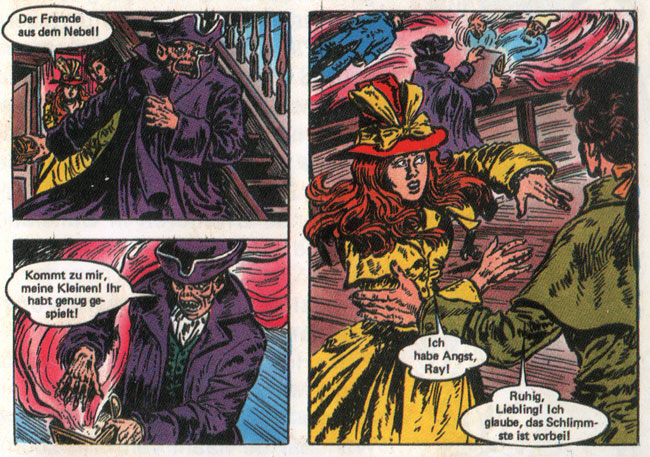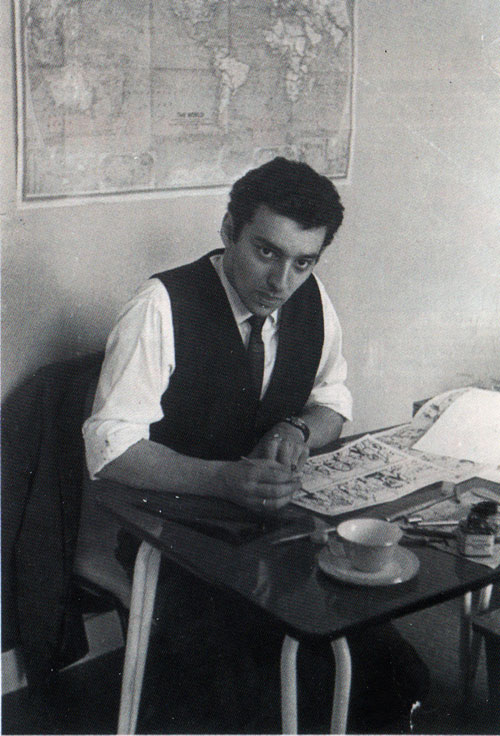Frank Sels was a Flemish comic artist, nicknamed "Europe's fastest comic artist" for his immense production for the German market. Beginning his career at Studio Vandersteen, he was an artist on Willy Vandersteen's realistic series 'Karl May' and 'De Rode Ridder', and worked on solo comics for Ons Land and Ohee! on the side. Accompanied by fellow artist Edgard Gastmans, he was the lead artist on Vandersteen's 'Bessy' production for Bastei Verlag in Germany between 1967 and 1969, cranking out a full 28-page story every week. Sels then worked directly for Bastei, creating his own western series about a young Native American, 'Silberpfeil' (1969-1986), on an equally productive rate. It was popular enough to inspire its own magazine and additional publications in Dutch and Scandinavian.
Early life and career
François "Frank" Sels was born in 1942 in Antwerp, and showed an early talent for drawing. His childhood drawings were filled with Native Americans, cowboys and knights, foreboding the main subjects of his later comic output. By the age of 14, he enrolled at the Stedelijk Instituut voor Sierkunsten en Ambachten (City Institute for Ornamental Art and Crafts) in Antwerp's Cadixstraat. Among his fellow students were future skiffle singer Ferre Grignard, political activist Koen Calliauw, future Studio Vandersteen co-worker Frans Anthonis and, most notably, Hugo Renaerts, with whom he struck a lifelong friendship.
At the academy, Sels and Renaerts worked on their own comic strips, much to the dislike of their teachers. In a testimonial Renaerts wrote for Brabant Strip Magazine #143 (October 2006), the scriptwriter remembered Sels as talented and eccentric. One time, he climbed a power pylon and fell down from ten meters high, leaving him with regular hospitalizations for the rest of his life. Graphically, Sels was a great admirer of Hans G. Kresse and Paul Cuvelier, who remained his main influences. His admiration went so far that in 1963, he even named his son Erwin, after the son of Kresse's signature character 'Eric de Noorman'. Other influences throughout his further career were Jijé, Jean Giraud, Victor de la Fuente, René Follet and Michel Blanc-Dumont. François Sels had his first job at a printing firm, before joining Studio Vandersteen.
De Rode Ridder #19 - 'Koning Arthur'.
First Studio Vandersteen period (1963-1966)
In 1963, the twenty-year old Sels was hired by Willy Vandersteen as a replacement for Karel Verschuere, who had just been fired (for the first time). His first task was drawing Vandersteen's 'Karl May' comic books, based on the famous western novels about 'Old Shatterhand' and 'Winnetou'. He worked on the series until 1966, when the rehired Verschuere resumed his role as artist. Between 1963 and 1966, Sels was additionally the main artist behind Vandersteen's chivalry comic 'De Rode Ridder' ('The Red Knight'), before Eduard De Rop took over. He also helped Vandersteen ink some 'Bessy' stories for newspaper De Standaard. In the summer of 1966, Sels left in the hope of making a name for himself with his solo comics.
'Het Geheim van de Pa Sapa' (Ohee! #320).
Solo comics for Ohee! and Ons Land
Since 1964, Frank Sels had additionally provided regular comics to Ohee!, the magazine with a weekly full comic story, published by newspaper Het Volk. A recurring Sels feature was the Viking comic 'De Zeearend', which appeared in five Ohee! issues between 1964 and 1968. By June 1965, Ohee! was filled with a Sels comic at least once a month. These were mostly historic adventure comics, scripted by Lorenzo Wadlin or Sels' childhood friend Hugo Renaerts. Among the titles were 'Mister Grizzly', 'Abraham Lincoln', 'De Illias' and 'Tall Bull'. Another recurring character was the jungle hero 'Tarbu, de jongen van de jungle' (three stories, 1969).
In February 1965, Sels and Renaerts were also present in Ons Land, the weekly family magazine published by Orbis. Until December of that year, they contributed two stories about the little Native American 'Kleine Antilope', the precursor of 'Silberpfeil'. In May 1967, the authors returned in Ons Land with a new adventure of 'De Zeearend', called 'De Wolven van Scaggar'. With a humorous drawing style, Sels appeared in 't Kapoentje, the weekly children's supplement of newspaper Het Volk. He contributed stories like 'Bongo tegen de Kux Klan' (June-December 1967) and 'Arkulleke' (February-August 1968). The latter was set in the Gallo-Roman period, notably inspired by René Goscinny and Albert Uderzo's 'Astérix'. Most of Sels and Renaerts' comics for Ons Land and 't Kapoentje were later reprised in Ohee!, sometimes amended or supplemented with additional pages.
Cover illustrations for Ohee (25 January 1969 and 14 September 1968).
Studio Bessy
Frank Sels' hopes for a successful solo career however fell short. In fact, after leaving Studio Vandersteen in mid-1966, it seemed he was less in demand by his other clients as well. So by April 1967 he was back with his old employer. He became part of Vandersteen's separate unit in the Antwerp Grétrystraat, where the stories of the western series 'Bessy' were produced for the German publisher Bastei Verlag. Since 1952, 'Bessy' ran in Dutch and French, but the adventures of the heroic collie proved such a colossal hit in Germany too, that exclusive stories were produced for this market. At first, Sels worked alongside Karel Biddeloo and Edgard Gastmans under supervision of Karel Verschuere.
Suffering from personal problems, Verschuere was unfit to lead the team, and his co-workers went to Vandersteen to complain. Sels and Gastmans did their taskmaster a daring proposal. They bragged that they could pull off the same amount of work with just the two of them, promising an increase in quality and cost reduction. As a result, Verschuere was fired, and Biddeloo was relocated to Vandersteen's Kalmthout studio. Sels and Gastmans more or less fulfilled their promise. Between October 1967 and June 1969, they cranked out a complete 28-page 'Bessy' story every week. Daniël Jansens took care of the scripts, while other artists like Eugeen Goossens and Eduard De Rop drew an occasional issue as well. The Sels-Gastmans period took off with the German issue #73, 'Die Wette gilt!', and lasted until issue #158, 'Im Kugelregen am Snow-River' (2 June 1969).
Bessy #73 - Die Wette gilt! (the first Bastei issue of the Sels-Gastmans period).
Silberpfeil
Still, Frank Sels was an ambitious person. In late 1968, he struck a personal deal with Bastei Verlag for the creation of a new western series. Gastmans joined him in this venture. 'Silberpfeil, der Junge Häuptling' ("Silver Arrow, the Young Chieftain", 1969-1986) first saw print on 6 January 1969 in the Bastei magazine Felix. The first story was a reworking of Sels and Renaerts' 'Kleine Antilope' stories. After eight episodes, the character aged and became head of the Kiowa tribe. The chief lives together with his wife Mondkind and their pet puma Tinka. His best friend and blood brother is the cowboy Falk. The stories were typical cowboy tales. In some narratives, Old Shatterhand, Winnetou and even the cast of the TV show 'Bonanza' had cameos.
Kleine Antilope - 'De Doorbraak' (Ohee, 1966), precursor to 'Silberpfeil'.
Initially, Sels and Gastmans kept their position at Studio Bessy, so with an additional 14 pages of 'Silberpfeil', they had to produce a total of 42 comic pages each week. 'Silberpfeil' scriptwriter Hugo Renaerts stepped in to pencil an occasional 'Bessy' story too, but it goes without saying that quantity went before quality in this heavy production schedule. Sels and Gastmans had to work day and night to keep up. With their Vandersteen contract terminated in June 1969, they could devote all their time to 'Silberpfeil'. A bi-weekly 'Silberpfeil' magazine was launched by Bastei in June 1970, while the publication in Felix continued as well. By December 1971, Silberpfeil became a weekly magazine, and the serialization in Felix came to an end.
Studio Sels
Again tasked with a weekly production of 28 pages, Frank Sels set up his own Studio Sels. The collaboration with Gastmans ended somewhere in the early 1970s, but a new co-worker was found in Claus Scholz, who worked on 'Silberpfeil' between 1973 and 1980. Sels not only became a direct rival of Vandersteen, he also bought away several of Vandersteen's co-workers. Besides Gastmans, Studio Sels was joined by Robert Wuyts, Eric De Rop, Jean Bosco Safari and Jan van Rooy over the course of the 1970s, although most eventually rejoined Vandersteen. The major part of the 'Silberpfeil' stories were written by Hugo Renaerts, whose wife Greet Liégeois also penciled several episodes. The artist's son Erwin Sels joined the production in 1978, followed by daughter Danielle in 1982. Again, the emphasis was quantity over quality, with many stories and drawings rushed out to meet deadlines.
Zilverpijl - 'De Spaanse Ruiter'.
'Silberpfeil' was a great success. Many stories appeared in Dutch as 'Zilverpijl' in the magazines Ohee! and Ohee Club, with cover illustrations by Robert Wuyts (the German books had covers designed by the Spanish Studio Ortega). Additional translations followed in Norwegian ('Sølvpilen'), Swedish ('Silverpilen') and Finnish ('Hopeanuoli'). During the 1970s and 1980s, Sels made several attempts to self-publish Dutch-language album series, but all failed after two or three volumes. In these later reprints, precursor 'Kleine Antilope' often appeared under the name 'Kleine Wapiti'.
Over the years, Frank Sels' relationship with Bastei Verlag soured considerably. The publisher often mingled in the artwork, cutting out panels to make room for advertisements within the comic pages. On other occasions, they made changes in the dialogues without consulting Sels, or had Spanish artists make new stories with the characters without Sels' involvement at all. Bastei demanded Sels to drop the additional artists and produce every story himself, and often sent him inferior scripts, which Renaerts then had to put right. Many times, the outspoken comic artist raced to Germany to give his publisher a lashing. All in all, 'Silberpfeil' remained popular in Germany until halfway through the 1980s. By 1986, after about 700 stories were produced, the magazine switched to reprints and the production came to a halt.
Horror comic by Frank Sels.
Final years and death
When 'Silberpfeil' lost its silver lining, Sels tried to interest Bastei Verlag in new projects. All were rejected, although Sels was allowed to illustrate some stories for their horror magazine Gespenster Geschichten, written by Peter Mennigen. With his son Erwin, Frank Sels drew on a 20-page story about 'Kabouter Pumpie' ("Gnome Pumpie", 1984), written by a colleague from Erwin's courier job, Oscar Thibos, who also released it as a self-published comic book. Between 1986 and 1994 the character was revived by Thibos and artist Luc Poetzarelli for three new comic albums. Father and son Sels additionally collaborated on the samurai story 'Endo's Karma' (1985), published by Europrint. Frank Sels had completed about 30 pages of his sci-fi story 'Op Zoek naar Alfadir', when he committed suicide on 19 December 1986. He had just turned 44. Two years later, Silberpfeil magazine was discontinued.
Legacy and posthumous events
In later years, the work of Frank Sels found reappreciation and luxury reprints. Erwin Sels completed his father's unfinished 'Op Zoek naar Alfadir'. It appeared as 'Auf der Suche nach Alfadir: Aus der Zeit gerissen' (2004) in the 'Frank Sels Archiv' series, launched by the German publisher Wick Comics in 2004. This luxury collection contained German editions of Sels' non-Silberpfeil work, mostly from his Ohee period. In 2006, Wick also launched a reprint collection of 'Silberpfeil', releasing the stories as Sels intended them, without the interventions from Bastei Verlag.
Frank Sels in the 1960s.












